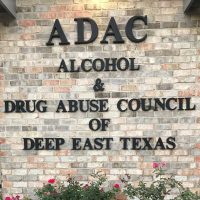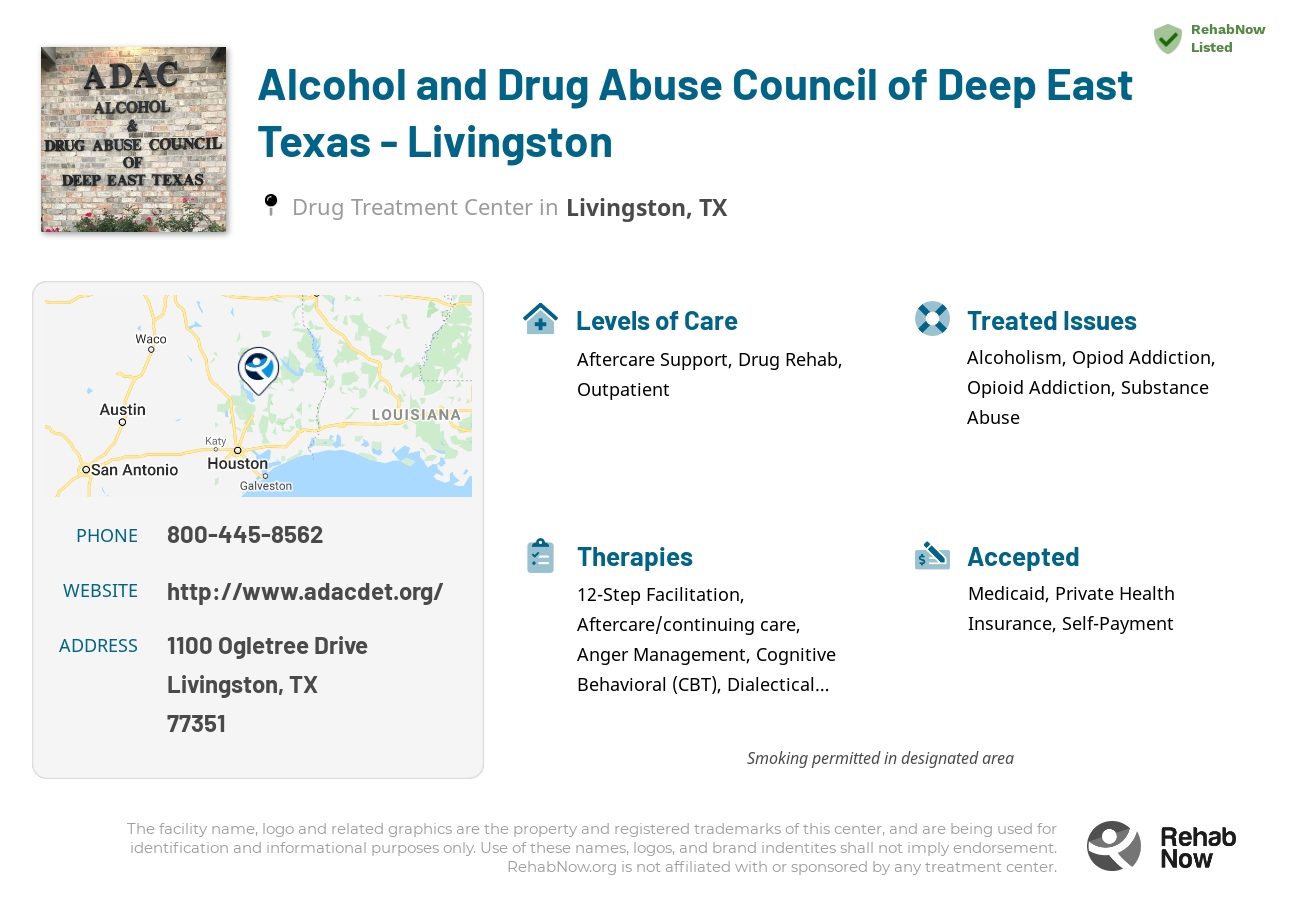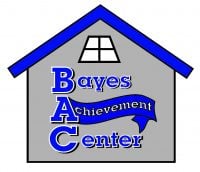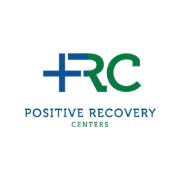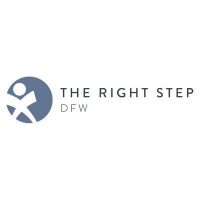Alcohol and Drug Abuse Council of Deep East Texas
Drug Rehab Center in Livingston, Texas
The Alcohol and Drug Abuse Council of Deep East Texas provides comprehensive, evidence-based treatment for individuals with alcoholism and other substance addiction problems, including outpatient care and various psychotherapies, in Livingston, TX, and accepts private health insurance.
About Alcohol and Drug Abuse Council of Deep East Texas in Texas
Located in Livingston, Texas, the Alcohol and Drug Abuse Council of Deep East Texas distinguishes itself with a dedicated outpatient program aimed at those grappling with addiction. This facility combines professional, compassionate services focusing on prevention, intervention, counseling, and recovery support. With a unique approach that accounts for financial eligibility to potentially lessen the treatment burden, it ensures that clients receive individualized care without financial strain.
- Financial Eligibility Consideration: Before admission, clients undergo a financial eligibility process to determine affordable fees, ensuring access to care is not hindered by financial constraints.
- Youth Outreach: Tailored outpatient services cater to young individuals, incorporating family education to foster a supportive recovery environment.
- Regular Progress Assessments: Clinical staff continuously assess clients' progress, adjusting the program's length and intensity to best suit individual recovery journeys.
Holding a state license, the Alcohol and Drug Abuse Council of Deep East Texas signifies its commitment to upholding high standards in addiction treatment. The center's practices include both individual and group therapies, with sessions designed to suit the unique needs of every individual, reflecting the center's dedication to personalized care pathways.
Focusing on a range of addictions, from alcoholism to opioid and other substance abuses, this facility employs various treatment methodologies. With services from 1 to 2 individual sessions per month and 1 to 2 education and group therapy sessions per week, alongside family education, it offers a comprehensive approach that spans multiple aspects of addiction recovery.
Genders
Ages
Modality
Additional
Conditions and Issues Treated
Substance abuse creates problems that affect people in Livingston, TX on many levels. First, substance abuse affects the individual who is abusing drugs or alcohol. This can result in health problems, including heart damage and overdose. Substance abuse also affects the user’s family, friends, co-workers, classmates, or peers. These people feel frustrated because they do not know how to help their loved ones struggling with addiction. At the same time, the addict cannot control his behavior. Lastly, friends and family members of addicts are affected financially by substance abuse.
The good news is that effective treatments can help prevent substance abuse or treat its effects on the user. These treatments, which include behavioral therapy and counseling sessions, target the underlying causes of substance abuse, helping users achieve sobriety so they can regain control over their lives. They also teach users to cope with stress in ways other than using drugs or alcohol.
Opioid addiction has become a significant health problem in the United States. When a person’s life becomes unmanageable because of an opioid addiction, treatment can help them get sober. Treatment includes medical care and counseling.
“With so many people struggling with opioid addiction, we need more care and attention for those who want to quit. Opioid addicts often take opioids when they experience a painful injury – that’s how the cycle starts! When someone begins taking their medication differently than prescribed or takes an excessive amount of drugs, it means they’re hooked on drugs and in danger of overdosing.
The most successful way to beat this is through detoxing from these types treatments at Alcohol and Drug Abuse Council of Deep East Texas in . Most facilities start by using medical support during the process while providing counseling services; rehabilitation comes later on after treatment has been completed successfully.
Levels of Care Offered
This center offers a variety of custom treatment tailored to individual recovery. Currently available are Outpatient, with additional therapies available as listed below.
Outpatient programs at Alcohol and Drug Abuse Council of Deep East Texas, the Livingston resident can live with their family while continuing with their job or studies. Treatment includes educating the patient on drug abuse, medications, and counseling sessions at the individual or group level. Outpatient treatment plans cover diagnosis, detoxification, management, and counseling. They are a popular option for those who have graduated from inpatient facilities.
Therapies & Programs
Individual therapy is a form of counseling where you meet with a trained professional one-on-one. Meeting with a therapist in this setting allows for a personal and trusting relationship to be built. This allows the patient to open up about sensitive or private issues they may not feel comfortable discussing in a group. Individual therapy helps identify the root causes of your addiction, which can help prevent relapse.
Family therapy is often done alongside drug treatment to help addicts stay sober. The goal of family therapy for drug addiction is to create an environment where communication can happen without judgment, hostility, or blame. The therapist will sit with the family so they can learn how to communicate differently and provide new tools for dealing with emotions so that people don’t want to drink or do drugs. It’s important for families to focus on relapse prevention plans during treatment so that if the addict feels like they want to use again, they’ll know what steps they need to take together to prevent it from happening again in the future.
Group therapy sessions are another common addiction recovery service. These group sessions typically involve six to 12 addicts who meet regularly with a trained professional for support and guidance.
During these sessions, the group shares their experiences with one another and provides feedback that can help each member avoid relapse or overcome specific obstacles they are facing in their recovery process. With this type of support and guidance, addicts can feel like they are part of a community that understands their struggles and will help them get through the hard times.
Dialectical Behavior Therapy was developed in the 1980s to treat chronically suicidal individuals. It is a cognitive-behavioral therapy that combines standard DBT with strategies derived from Zen Buddhism, such as mindfulness training.
DBT has been adapted for use with other types of psychiatric problems, including eating disorders, substance abuse disorders, borderline personality disorder, posttraumatic stress disorder (PTSD), and other personality disorders. Dialectical Behavior Therapy is considered a psychosocial treatment of BPD. This means that while it can be used alone or in conjunction with drug treatments, DBT does not rely on medications to treat the disorder. Instead, DBT aims to help patients change their thinking and behavior.
Cognitive Behavioral Therapy (CBT) focuses on the underlying thoughts and behaviors that caused the problem of addiction in the first place and may cause a relapse. Negative feelings are common in drug abuse disorders, but they can lead to co-occurring disorders if not recognized. CBT involves strategies that help to change the behavior pattern by restructuring negative thoughts into positive ones. It helps to remove these feelings, and it provides long-term benefits. Also, CBT promotes self-awareness and self-control. It can be administered as a monotherapy or as part of combination therapy.
CBT can improve the patient’s mood, reduce drug cravings and boost success rates on treatment plans. Regular practice can help individuals handle negative attitudes, thoughts, and feelings without turning to drugs or alcohol. The core belief of Cognitive Behavioral Therapy (CBT) is that one’s moods, behaviors, and actions are all connected. Individuals can improve their quality of life using CBT. It helps addicts understand the patterns of thought and feelings that cause them to use drugs or alcohol and develop a healthy response.
Eye Movement Desensitization and Reprocessing (EMDR) therapy is a treatment method that helps reduce the impact of traumatic memories on individuals. It involves following a bar of light or watching a therapist’s finger move back and forth. This mimics the eye movements of REM sleep, which allows the brain to reprocess memories. EMDR therapy is combined with behavioral therapies to address the root cause of the problem. This reduces the desire to escape painful memories with drugs.
EMDR can be helpful for people who turn to drugs to escape traumatic events. It is a treatment that reduces the impact these memories have on emotions. Individuals who suffer from negative feelings associated with a traumatic experience can find relief in EMDR therapy. This treatment is combined with behavioral therapies. Patients follow a bar of light throughout the session or watch their therapist’s finger move back and forth. These rapid eye movements reduce feelings of negativity and promote calmness and relaxation. This minimizes the impact traumatic memories have on emotions, reducing the desire to escape painful memories with drugs.
Patient Experience
Experiential Therapy at Alcohol and Drug Abuse Council of Deep East Texas
Drug addiction causes the formation of abnormal connections between neurons in the brain to form due to repeated exposure to drugs. These connections are responsible for addictive behaviors to drugs. Experiential therapy is done with patients individually and is different from traditional talk therapy. This therapy can help people revisit past traumas, heal, and move on in life in a more authentic way.
Experiential therapy uses activities to recreate experiences that may have caused trauma or negative emotions. These activities include role-playing, arts and crafts, animal care, music, or rock climbing. The individual will gradually experience calmness and love and change their perception positively through this therapy. Other than drug addiction, experiential therapy can be helpful for behavioral or eating disorders.
Payment Options Accepted
For specific insurance or payment methods please contact us.
Is your insurance accepted?
Ask an expert, call (888) 674-0062
Alcohol and Drug Abuse Council of Deep East Texas Associated Centers
Discover treatment facilities under the same provider.
- ADAC in Jasper, TX
- Alcohol and Drug Abuse Council of Deep East Texas in Nacogdoches, TX
- Alcohol and Drug Abuse Council of Deep East Texas in Lufkin, TX
- Alcohol and Drug Abuse Council of Deep East Texas - Livingston in Livingston, TX
- Alcohol and Drug Abuse Council of Deep East Texas - Lufkin in Lufkin, TX
Learn More About Alcohol and Drug Abuse Council of Deep East Texas Centers
Additional Details
Specifics, location, and helpful extra information.
Livingston, Texas 77351 Phone Number(800) 445-8562 Meta DetailsUpdated April 15, 2024
Staff Verified
What else do people call Alcohol and Drug Abuse Council of Deep East Texas?
People have occasionally also searched for “Alcohol and Drug Abuse Council of Deep East Texas in Texas”
Alcohol and Drug Abuse Council of Deep East Texas Patient Reviews
There are no reviews yet. Be the first one to write one.
Livingston, Texas Addiction Information
Texas is one of the primary hubs for drug smuggling into the country. The border between Texas and Mexico is more than 1,000 miles long. More than 10 million residents use alcohol every year and more than 25% of those are minors. Alcohol and drug use has become so common in Texas that almost 15% of all deaths can be attributed to these substances.
Livingston has been hard hit by the opioid crisis and prescription painkiller abuse. For the majority of drug users in Livingston, their first drug was prescription painkillers. 27% of drug users in Livingston began using drugs before the age of 18. 66% of overdose deaths are due to opioids. Livingston offers a wide variety of treatment programs. These programs include inpatient and outpatient treatment, faith-based programs, and detoxification services.
Treatment in Nearby Cities
- La Marque, TX (94.5 mi.)
- Big Spring, TX (399.6 mi.)
- Grapevine, TX (197.3 mi.)
- Eastland, TX (255.9 mi.)
- Wylie, TX (183.1 mi.)
Centers near Alcohol and Drug Abuse Council of Deep East Texas
The facility name, logo and brand are the property and registered trademarks of Alcohol and Drug Abuse Council of Deep East Texas, and are being used for identification and informational purposes only. Use of these names, logos and brands shall not imply endorsement. RehabNow.org is not affiliated with or sponsored by Alcohol and Drug Abuse Council of Deep East Texas.
